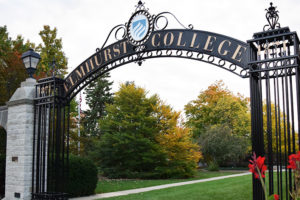
With candor and humor, award-winning journalist Bob Woodward and senior Judge William J. Bauer carried on a wide-ranging conversation about American politics, the media and the criminal justice system during a joint appearance before a capacity crowd at Elmhurst College.
The May 17 event, Truth and Justice in America, was highlighted by Woodward’s anecdotes about the historic figures he has come to know in his decades of reporting, including presidents Richard Nixon, Bill Clinton and Barack Obama. But his views on being a journalist and what it means to pursue the truth were among the most poignant moments of the evening.
“I have no illusions that I know everything,” said Woodward, who won the Pulitzer Prize for his reporting on the Watergate scandal and has written 16 bestselling books. “You have to have the humility of realizing the things you don’t know, the things you don’t understand and the things you can’t explain. What’s important is not to reach beyond the evidence and facts.”
Bauer, a longtime judge on the U.S. Court of Appeals for the Seventh Circuit, said he faced similar challenges in the pursuit of justice. “My definition of justice is following the law,” he said. “I do not think I’m exercising perfect justice. But I can listen to the facts and follow the law in making my decisions.”
Longtime family friends, Woodward and Bauer spoke to a crowd of about 1,200 in Hammerschmidt Memorial Chapel; the event culminated the yearlong Democracy Forum lecture series at Elmhurst College.
It was a homecoming of sorts for Woodward, who grew up in nearby Wheaton. Bauer, meanwhile, was making one of his frequent appearances at his alma mater (Class of 1949), where he is also a member of Elmhurst College’s Board of Trustees.
The moderator, retired Illinois Supreme Court Justice S. Louis Rathje, also had a connection. From 1970 to 1992, he was a partner in the Wheaton-based law firm Rathje, Woodward, Dyer & Burt, which included Bob Woodward’s father, attorney and judge Alfred Woodward.
Rathje asked his two guests a series of questions about current affairs, including the news media’s role in American politics. Bauer rose to the media’s defense, calling it the “fourth estate” that keeps an important check on government.
“The media keeps the entire system honest,” Bauer said. “Every time you do something, somebody’s looking over your shoulder. There’s a little voice saying somebody’s watching you.”
Woodward was much more cynical, concerned that the decline of newspapers and job cutbacks in newsrooms has weakened investigative journalism and the pursuit of important stories.
“That is the danger and peril of having crippled media—media that’s not aggressive enough, not digging, not working,” Woodward said. “My worried prediction is, we’re going to miss something. … There’s going to be a calamity and people are going to say, ‘Where’s the media?’”
He and Bauer had differing views about the political partisanship that’s deadlocking Washington. “I think it began with television,” which brought the Supreme Court nomination proceedings, for example, into American living rooms, Bauer said. Now every politician uses the photo opportunities and TV coverage “for their own purposes,” he said. “I think it’s the focus of media attention which has brought us such partisanship.”
Woodward laid blame directly on politicians. “There is an impulse in the White House or any [government] institution to conceal,” Woodward said. “What I worry about is the natural reflex: Let’s not tell the whole story. Let’s spin.”
The judicial branch didn’t escape the speakers’ scrutiny either. A questioner from the audience asked them about the Supreme Court’s recent controversial ruling that overturned the campaign finance law restricting corporations and political action committees from spending money on political campaigns. Critics say this has led to the flood of negative advertisements in the current presidential campaign. Bauer and Woodward said it was a delicate free speech issue.
“It’s a First Amendment problem, whether you can spend your own money doing what you want. People can’t tell you that you can’t spend money to elect someone,” Bauer said. Woodward agreed, but added that the decision will cast a dark shadow on the presidential election.
“I don’t think the issue will be revisited,” Woodward said. “[But] in the next six months in this presidential election we are going to travel down the sewer because the Super PACs on both sides are going to spend probably hundreds of millions of dollars on negative advertising.”
Bauer summarized the evening by saying that no one is perfect, and that all people can do is to be honest and to try their best. “I’m not sure I do perfect justice,” Bauer said; then, nodding to Woodward, added, “and I’m not sure he’s writing the perfect truth.”
Having the opportunity to have such a candid discussion of important social and political topics was the purpose of the Democracy Forum, said Elmhurst President S. Alan Ray.
“I think it was fascinating to hear two such prominent people bring historical context to contemporary issues,” Ray said. “I think the Forum offered a rare opportunity to hear intelligent discussion of some very important issues.”